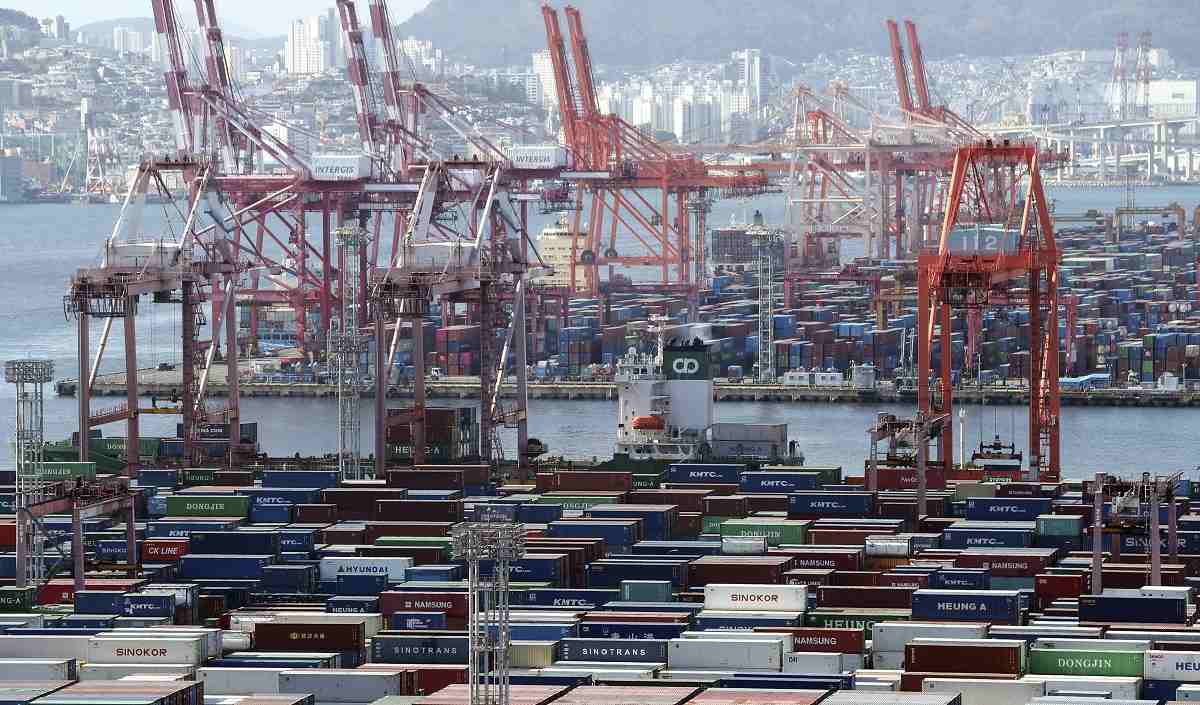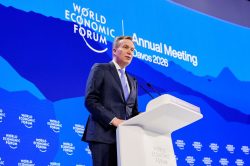
Containers are seen at the country’s largest port, in Busan, South Korea, on Jan. 10, 2023.
15:29 JST, February 1, 2023
SEOUL, South Korea (AP) — South Korea logged its biggest monthly trade deficit ever, at $12.7 billion in January, as exports of computer chips and other high-tech items sank and costs for importing oil and gas surged, the trade ministry said Wednesday.
The growing shortfall underscored how Russia’s war on Ukraine is straining the global economy, keeping prices for key resources like crude oil and nickel high even after they fell back from spikes in 2022.
South Korea’s export-dependent economy has logged a deficit for 11 consecutive months, the longest streak since 1997 when it was on the cusp of the Asian financial crisis.
Exports of computer chips, South Korea’s most important product, declined by nearly 45% last month from a year earlier because of slowing demand and falling chip prices, according to South Korea’s Ministry of Trade, Industry and Energy.
The trade data was released after South Korean chip giant Samsung Electronics reported that its profit for the last quarter plunged by nearly 70% in what it described as a “significantly” deteriorated business environment for its semiconductors and consumer electronics products.
Chip making is highly cyclical, and tech industries have swung from stark shortages for many computer chips, felt across many industries including automaking, to a glut.
Samsung said chip prices fell sharply amid weakened demand as clients adjusted their inventories in face of “deepening uncertainties” in the global economy, a problem the company says will likely extend through this quarter.
On Wednesday, SK Hynix, another major South Korean chipmaker, reported an operating loss of 1.7 trillion won ($1.4 billion) for the October-December period, which marked its first quarterly deficit since 2012.
“With uncertainties still lingering, we will continue to reduce investments and costs, while trying to minimize the impact of the downturn by prioritizing markets with high growth potential,” the company said in a statement.
SK Hynix announced plans in October to reduce its investments in 2023 by more than a half compared to the 19 trillion won ($15 billion) it spent in 2022.
The trade ministry said the country’s exports during January declined by nearly 17% from a year earlier, with the modest increase in the sales of cars, petroleum products and ships failing to offset the larger drop in semiconductor shipments.
The country, which depends on imports to provide most of its energy supplies, spent nearly $16 billion purchasing fuel, gas and coal last month. This was considerably higher than the average of $10 billion the country spent to import those items during the Januarys of the previous 10 years, senior trade official Moon Dong-min said.
“The global economy remains sluggish, due to the contractionary policies of major economies and the prolonging of Russia’s war on Ukraine,” Moon said in a briefing.
He said the war, which has left countries grappling with higher prices and slower growth, has taken a similar toll on other economies dependent on industrial exports, including China, Japan and Germany.
Moon said the global semiconductor market will likely remain sluggish over the next few months before recovering in the later half of the year following the depletion of existing inventories.
“If the exports of semiconductors recover, that would be a huge help in letting our (country’s) exports recover,” Moon said.
Top Articles in News Services
-

Survey Shows False Election Info Perceived as True
-

Hong Kong Ex-Publisher Jimmy Lai’s Sentence Raises International Outcry as China Defends It
-

Japan’s Nikkei Stock Average Touches 58,000 as Yen, Jgbs Rally on Election Fallout (UPDATE 1)
-

Japan’s Nikkei Stock Average Falls as US-Iran Tensions Unsettle Investors (UPDATE 1)
-

Trump Names Former Federal Reserve Governor Warsh as the Next Fed Chair, Replacing Powell
JN ACCESS RANKING
-

Producer Behind Pop Group XG Arrested for Cocaine Possession
-

Japan PM Takaichi’s Cabinet Resigns en Masse
-

Man Infected with Measles Reportedly Dined at Restaurant in Tokyo Station
-

Israeli Ambassador to Japan Speaks about Japan’s Role in the Reconstruction of Gaza
-

Videos Plagiarized, Reposted with False Subtitles Claiming ‘Ryukyu Belongs to China’; Anti-China False Information Also Posted in Japan

























